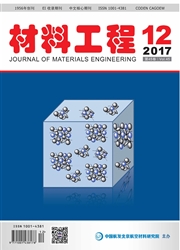

 中文摘要:
中文摘要:
采用XRD,SEM和EMPA等分析方法研究了表面喷涂碱金属硫酸盐的Super304H在750℃空气中的耐高温腐蚀特性。结果表明:Super304H在腐蚀初期发生高温氧化,动力学曲线遵循抛物线规律,表面生成相对致密且具有保护性作用的铁/铬氧化膜;延长腐蚀时间,生成挥发性腐蚀产物Na4(CrO4)(SO4);氧化膜增厚,变得疏松多孔,近基体表面处细小孔隙萌生,并聚集长大成微裂纹、微孔洞,基体内部发生内硫化。分析认为:低熔点共晶体Na2O·Na2SO4的形成以及Cr2O3在硫酸盐中的碱性熔融促进了腐蚀加速与持续。
 英文摘要:
英文摘要:
The corrosion behavior of Super304H coated alkali metal sulfate at 750℃ was investigated by means of XRD, SEM and EMPA. The results show that high-temperature oxidation mainly occurs at the earlier corrosion stage and the kinetics curves follow a parabolic law. Moreover, the compact and protective Fe/Cr oxide films form on the surface of the sample. Corrosion time is prolonged, and volatile corrosion product Na4 (CrO4)(SO4) is produced. The oxide films are thickened and become loose as well as porous. Meanwhile, fine porosity initiates near base material surface, gathers and grows into micro-cracks, micro-pores, and thus internal sulfidation and micro-defects occur inside the base material. It is concluded that the formation of low melting point eutectic Na2O· Na2 SO4 and the basic fluxing of Cr2 03 in molten Na2 SO4 accelerate the development of corrosion process.
 同期刊论文项目
同期刊论文项目
 同项目期刊论文
同项目期刊论文
 Effects of annealing treatment on microstructure and hardness of bulk AlCrFeNiMo0.2 eutectic high-en
Effects of annealing treatment on microstructure and hardness of bulk AlCrFeNiMo0.2 eutectic high-en Effect of Mo and Ni elements on microstructure evolution and mechanical properties of the CoFeNixVMo
Effect of Mo and Ni elements on microstructure evolution and mechanical properties of the CoFeNixVMo Oxidation behavior of high-entropy alloys AlxCoCrFeNi (x=0.15, 0.4) in supercritical water and compa
Oxidation behavior of high-entropy alloys AlxCoCrFeNi (x=0.15, 0.4) in supercritical water and compa Microstructure and Mechanical Properties of a CoFeNi2V0.5Nb0.75 Eutectic High Entropy Alloy in As-ca
Microstructure and Mechanical Properties of a CoFeNi2V0.5Nb0.75 Eutectic High Entropy Alloy in As-ca Effects of electro-negativity on the stability of topologically close-packed phase in high entropy a
Effects of electro-negativity on the stability of topologically close-packed phase in high entropy a Microstructure Evolution and Nitridation in an As-Cast 25Cr-35Ni-1Mo Radiant Tube After Long-Term Se
Microstructure Evolution and Nitridation in an As-Cast 25Cr-35Ni-1Mo Radiant Tube After Long-Term Se High temperature corrosion and microstructure deterioration of KHR35H radiant tubes in continuous an
High temperature corrosion and microstructure deterioration of KHR35H radiant tubes in continuous an Leaching behaviour and environmental risk assessment of heavy metals from electronic solder in acidi
Leaching behaviour and environmental risk assessment of heavy metals from electronic solder in acidi 期刊信息
期刊信息
